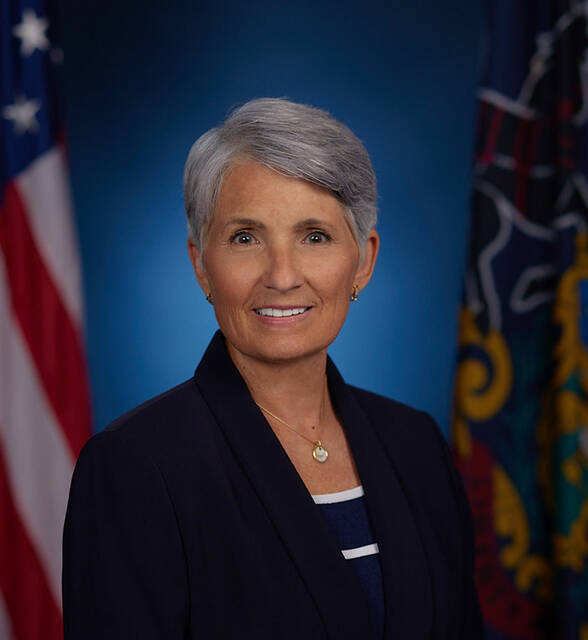WILKES-BARRE — Gov. Josh Shapiro this week signed House Bill 1103 into law — known as Act 16 of 2025.
The law will take effect in 60 days and amends the Mortgage Licensing Act (MLA) to clarify that discount points may be collected on first and secondary mortgage loans made by non-bank mortgage lenders licensed by the Pennsylvania Department of Banking and Securities (DoBS).
The MLA licenses mortgage originators and mortgage companies and regulates the origination and servicing activity for Pennsylvanians. Under this amended law, borrowers can now buy down their interest rate on first and second mortgage loans, helping to reduce their monthly payment.
“For many hard-working people, home ownership is their American dream,” said DoBS Secretary Wendy Spicher. “Now that mortgage lenders can offer discount points, homeowners can reap the benefits by having lower monthly payments and get additional access to credit. This new law ensures consistency across the majority of states and benefits Pennsylvania homeowners.”
DoBS licenses and regulates about 600 non-bank mortgage lenders along with about 1,900 branches that make first and second mortgage loans under the MLA.
Recently, the Governor launched a centralized consumer protection hotline, website, and email — 1-866-PACOMPLAINT, pa.gov/consumer, and [email protected] — making it easier than ever for Pennsylvanians to report scams, resolve financial or insurance issues, and get connected to the right state agency for help.
Bill to address nursing shortage approved by committee
Legislation to support and sustain a strong, well-trained nursing workforce across Pennsylvania that was introduced by state Rep. Bridget Kosierowski, D-Waverly, was approved this week by the House Labor & Industry Committee today.
The legislation — H.B. 1676 — addresses Pennsylvania’s growing nursing shortage. According to a Hospital and Healthsystem Association of Pennsylvania survey, Pennsylvania hospitals reported that an average of 14 percent of their nursing positions are unfilled, leaving existing nurses stretched thin and working longer hours. The situation is projected to worsen, with the state expected to face a shortage of 20,000 nurses by 2026.
“Nurses are an integral part of our healthcare system, from providing critical bedside care to educating patients and families to advocating for patient needs with hospital staff,” said Rep. Kosierowski. “Without them, our health care system won’t be able to provide lifesaving care to the public.”
According to Kosierowski, fewer people entering the nursing profession has created an untenable workplace situation of longer hours and greater patient loads, causing many nurses to leave the profession due to high stress and burnout. In addition, many nurses are at retirement age and are expected to soon leave the profession. The result of having fewer nurses on hospital staffs has negatively impacted patient care, with increased mortality rates and diminished health outcomes for many patients.
“My legislative proposal is an outside-the-box solution to increase the recruitment and training of new nurses,” Kosierowski said. “My legislation would strengthen and support the nursing pipeline by paying in part for school loans and helping newly trained nurses secure employment.”
Rep. Kosierowski’s legislation would establish the Nursing Shortage Assistance Program within the Department of Labor and Industry. The program would provide grants to qualified nursing servicers to assist nursing students with securing post-graduation employment and repaying student loans incurred while obtaining a nursing degree from an educational institution located in the Commonwealth.
“My legislation would help the Commonwealth provide more creative and collaborative solutions to the nursing care shortage with the goal of helping our struggling healthcare system better serve the public,” Kosierowski said.
House Bill 1676 moves to the full House of Representatives for consideration.
Bill introduced to improve Medical Marijuana Program
Sen. Dan Laughlin, R-Erie, has introduced legislation with the goal of improving the oversight of Pennsylvania’s Medical Marijuana Program and the current unregulated products by establishing the Pennsylvania Cannabis Control Board.
Specifically, Senate Bill 49 would transfer regulatory control of the Medical Marijuana Program to the newly created Cannabis Control Board as well as establish uniform safety standards for untested and potentially harmful intoxicating hemp products currently available for purchase by the public.
“Since the 2016 legalization of medical marijuana in Pennsylvania, the state Department of Health’s oversight of the Medical Marijuana Program has been glaringly inconsistent, inefficient and lacking transparency,” said Laughlin. “That coupled with the concerning unregulated intoxicating hemp products being proliferated across our commonwealth warrants the need for a dedicated regulatory board to eliminate these inconsistencies, enhance transparency and provide the structure needed to responsibly manage this industry.”
This legislation comes in light of a recent hearing held by the Senate Law and Justice Committee, chaired by Sen. Laughlin, which brought attention to the massive public safety risk posed by intoxicating hemp products in Pennsylvania — products derived from hemp legalized under the 2018 Federal Farm Bill.
“One of the first tasks this board will tackle is regulating these intoxicating hemp products,” added Laughlin. “Without proper oversight of these products, they will continue to thrive in this legal gray area and be sold without proper age guidelines, labeling and without the collection of any tax revenue.”
State announces $80M to support community infrastructure projects
The Pennsylvania Department of Transportation (PennDOT) this week announced the 2025 Transportation Alternatives (TA) Set-Aside of the Federal Highway Administration’s (FHWA) Surface Block Grant Program will begin accepting applications on July 14, and be open for submissions through Oct. 31.
The program will offer a total of $80 million across award recipients, supporting the Administration’s goal of expanding access to a range of transportation options and improving safe access to schools in communities across Pennsylvania.
A webinar for municipalities and other project sponsors will be held on Wednesday, July 9, at 10 a.m. to talk through the application process and answer questions that applicants may have — project sponsors may include regional transportation authorities, transit agencies, public land agencies, and school districts, local education agencies or schools.
“Pennsylvanians make decisions about how they travel for many reasons, the most critical of which is the infrastructure available to them,” said PennDOT Secretary Mike Carroll. “The TA Set-Aside program offers communities around the Commonwealth the opportunity to improve infrastructure and provide residents with a broader range of transportation options.”
TA Set-Aside program provides funds to construct pedestrian and bicycle facilities, improve access to public transportation, create safe routes to schools, incorporate community improvements such as historic preservation and vegetation management, provide environmental mitigation related to stormwater and habitat connectivity, create trail projects that serve a transportation purpose, and provide for vulnerable road user safety assessment program projects.
Draft applications must be submitted to PennDOT district offices by Sept. 5. All participating large Metropolitan Planning Organizations’ (MPOs) selections and all District and Planning Partner application review comments will be due Jan. 23, 2026.
Reach Bill O’Boyle at 570-991-6118 or on Twitter @TLBillOBoyle.







